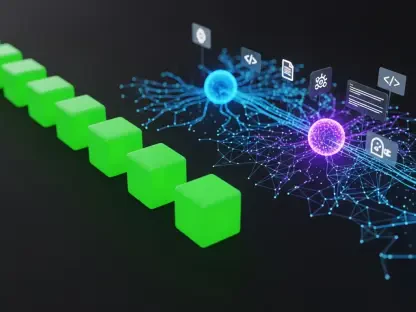The integration of Artificial Intelligence (AI) and Machine Learning (ML) with DevOps is a game-changer for software development and IT operations. This collaboration is revolutionizing traditional methods, enhancing automation, and improving efficiency. AI and ML are not just beneficial but pivotal to the future of DevOps, offering predictive analytics, automation, and smarter decision-making. Experts like Daniel Peter from Faros AI and Jennifer Tejada from PagerDuty emphasize the importance of this transformation, which extends beyond automation to augment human decision-making.
The Evolution of DevOps: From Continuous Integration to AI-Driven Insights
Breaking Down Silos with DevOps
Initially, DevOps emerged to break down the silos between software development and IT operations. The objective was to foster a culture of continuous integration and continuous deployment (CI/CD). By eliminating barriers, DevOps facilitated more streamlined processes and improved collaboration between teams.
In the past, DevOps success relied heavily on manual intervention and human judgment. However, this traditional approach had limitations, particularly in responding swiftly to complex and dynamic issues. Today, integrating AI and ML extends this DevOps paradigm by enabling systems to learn from data, predict outcomes, and automate intricate tasks. This shift represents a fundamental transformation, marking a new era where technology takes on a more proactive role in software development.
Integrating Predictive Analytics
One of the major breakthroughs in AI-driven DevOps is predictive analytics. AI can identify potential system failures or performance bottlenecks before they escalate. This predictive capability is crucial in large-scale environments where downtime can incur significant financial losses. By foreseeing issues, teams can take preemptive measures to ensure smoother operations.
Predictive analytics also enhance system optimization. Through continuous monitoring and data analysis, AI models can recommend adjustments to improve performance and efficiency. This not only reduces downtime but also ensures optimal deployment processes, leading to a significant boost in overall productivity. Furthermore, predictive analytics can assist in capacity planning and workload management, ensuring that resources are utilized effectively to meet current and future demands.
Enhancing Code Quality and Security with AI/ML
Automated Code Review and Testing
Machine Learning models play a vital role in automated code review and testing. Traditionally, code reviews have been time-consuming and prone to human error. However, with ML, detecting code defects or security vulnerabilities becomes more efficient. This ensures more reliable software releases and accelerates the time-to-market.
AI-driven code analysis tools can scan through vast amounts of code quickly and accurately. By identifying potential bugs and security issues early in the development phase, AI not only improves code quality but also reduces the risk of vulnerabilities, contributing to a more secure software lifecycle. Such automated tools provide continuous feedback to developers, allowing for immediate corrections and improvements, thereby maintaining high coding standards and reducing downstream issues.
Intelligent Incident Management
AI’s role in incident management is transformative. By prioritizing alerts based on severity and automating root cause analysis, AI streamlines the incident management process. This reduces the mean time to resolution (MTTR) and enhances system reliability.
Incident management often involves sifting through numerous alerts to identify critical issues. AI can automatically categorize and prioritize these alerts, allowing IT teams to focus on the most pressing problems. Furthermore, AI’s capability to suggest remediation steps accelerates the resolution process and minimizes service disruptions. This proactive incident management reduces the stress on IT personnel, allowing them to concentrate on more strategic initiatives rather than being bogged down by routine troubleshooting.
Resource Optimization and Scalability
Predicting Resource Needs with ML
AI and ML excel in resource optimization by predicting resource needs based on historical data. In dynamic IT environments, accurate resource allocation is essential to prevent both over-provisioning and under-provisioning, which can impact costs and performance.
ML models analyze past usage patterns to forecast future demands. This ensures that resources are allocated efficiently, optimizing costs and performance. Dynamically adjusting resource allocations in real-time also helps maintain system stability and responsiveness, addressing scalability challenges effectively. This predictive allocation helps organizations manage their IT budgets better, ensuring that resources are neither wasted nor stretched too thin.
Enhanced Scalability Solutions
The use of AI and ML extends beyond resource prediction to include the implementation of scalable solutions. By leveraging data-driven insights, AI can recommend scalable architectures and infrastructure setups that match the evolving needs of the organization.
Organizations are increasingly adopting hybrid and multi-cloud strategies to enhance their scalability. These strategies offer flexibility and support large-scale deployment of AI/ML models. This approach ensures consistent performance across different environments and infrastructure variations. The flexibility provided by these strategies enables organizations to adapt quickly to changing business requirements, maintaining a competitive edge in a rapidly evolving digital landscape.
Addressing Integration Challenges
Overcoming Data Fragmentation
One of the significant challenges in integrating AI and ML with DevOps is data fragmentation. Data silos across different tools and platforms can hinder the development of comprehensive AI/ML models. Establishing a robust data governance framework and utilizing integration tools are essential to consolidate data effectively.
Data governance ensures that data is consistent, accurate, and accessible. By breaking down data silos, organizations can develop more accurate and comprehensive AI models, leading to better decision-making and more effective DevOps practices. This consolidated data approach allows organizations to leverage the full power of AI and ML, driving improvements across all aspects of their operations.
Bridging the Skill Gap
The fusion of Artificial Intelligence (AI) and Machine Learning (ML) with DevOps is a breakthrough for software development and IT operations. This synergy is revolutionizing traditional practices, driving automation, and boosting efficiency. AI and ML have moved beyond being just beneficial; they are now crucial for the evolution of DevOps. These technologies introduce predictive analytics, automate repetitive tasks, and enable smarter decision-making processes. Experts in the field highlight the significance of this shift. For instance, Daniel Peter from Faros AI and Jennifer Tejada from PagerDuty stress that the transformation goes beyond merely automating tasks. It aims to elevate human decision-making by providing robust analytical insights and predictive capabilities. This evolution allows teams to anticipate issues before they arise, streamline their workflows, and ultimately deliver higher-quality software at a faster rate. In summary, the integration of AI and ML with DevOps is setting a new standard in the software development industry, combining the strengths of both human and machine intelligence to foster innovation and efficiency.









